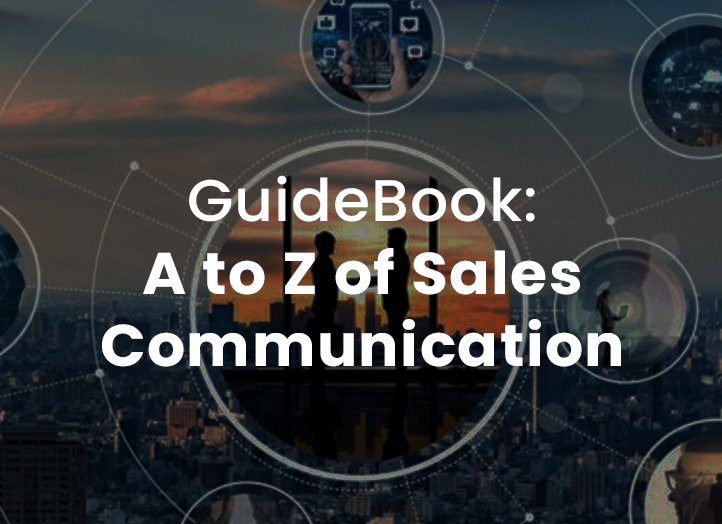
Guidebook: A to Z of Sales Communication
Master the Art of Sales Communication with this A to Z Series
Whether you’re a seasoned professional or just starting out, this resource will help you navigate the intricacies of engaging with clients, closing deals, and building lasting relationships. Dive in and discover how effective communication can transform your sales strategy from A to Z.
A – ALERTNESS
Example: An alert salesperson notices subtle cues indicating customer interest or hesitation, adjusting their communication accordingly.
Fact: According to research by Gartner, 89% of companies expect to compete mainly on customer experience, emphasizing the importance of alertness in understanding customer needs.
B – BENEFITS
Example: Focusing on benefits, a salesperson emphasizes how a product’s features directly solve the customer’s pain points, making the offering more appealing.
Fact: Studies show that highlighting benefits over features can increase sales conversion rates by helping customers see the direct value they gain.
C – CLARITY
Example: Providing clear and concise product information aids customer understanding, reducing confusion and enhancing the likelihood of a sale.
Fact: A survey by Sales Engine found that 51% of B2B buyers prefer content that is clear, concise, and easy to understand.
D – DEMONSTRATE
Example: Offering product demonstrations allows customers to experience its value first-hand, making them more likely to commit to a purchase.
Fact: Video demonstrations are particularly effective, with Wyzowl reporting that 84% of people say they’ve been convinced to buy a product or service by watching a brand’s video.
E – EDUTAIN
Example: Combining education with entertainment (edutainment) in sales presentations captures attention, making information more memorable and enjoyable.
Fact: The average person retains only 10% of what they hear but 65% of what they see, highlighting the impact of visual and engaging sales communication.
F – FOLLOW-UP
Example: Effective follow-up after a sales pitch involves personalized communication, addressing any concerns, and offering additional information or incentives.
Fact: The Harvard Business Review found that prompt follow-ups increase the likelihood of converting a lead into a customer by 30-50%.
G – GRIEVANCE-HANDLING
Example: Resolving customer complaints promptly and empathetically not only retains customers but can turn dissatisfied customers into loyal advocates.
Fact: A study by Lee Resources International revealed that for every customer complaint, there are 26 other unhappy customers who have remained silent.
H – HONESTY
Example: Transparent communication about product limitations or potential challenges builds trust, fostering long-term customer relationships.
Fact: According to a study by Label Insight, 94% of consumers are likely to be loyal to a brand that offers complete transparency.
I – INQUIRE
Example: Asking open-ended questions during sales conversations encourages customers to share insights, helping tailor the pitch to their specific needs.
Fact: Research by Gong.io found that top-performing salespeople ask 14.2 questions per hour on average, showcasing the importance of inquiring effectively.
J – JARGON-FREE
Example: Avoiding industry jargon ensures that the sales message is accessible to a broader audience, making the communication more inclusive.
Fact: A survey by the Harvard Business Review found that using jargon makes people less likely to follow through with a request.
K – KEEP-IN-THE-LOOP
Example: Keeping clients informed about order progress or updates demonstrates transparency and helps manage expectations.
Fact: The Aberdeen Group reported that companies with strong omnichannel customer engagement strategies retain, on average, 89% of their customers.
L – LISTEN ACTIVELY
Example: Actively listening to customer concerns allows salespeople to address specific needs, creating a more personalized and effective sales strategy.
Fact: A study by Salesforce found that 55% of customers feel that brands are out of touch with their needs, highlighting the importance of active listening.
M – MANNERS
Example: Politeness and courtesy in communication contribute to a positive customer experience, influencing their perception of the brand.
Fact: A survey by the International Journal of Business, Humanities, and Technology revealed that 68% of customers leave a business due to perceived rudeness.
N – NEUTRALITY
Example: Remaining neutral in discussions, especially when handling objections, ensures a fair and unbiased approach, fostering trust.
Fact: A study by Cohn & Wolfe found that 87% of global consumers believe it’s important for companies to “act with integrity at all times.”
O – OPENNESS
Example: Openly discussing pricing, terms, and conditions creates a transparent sales process, reducing uncertainty for the customer.
Fact: A report by Sprout Social found that 86% of consumers believe transparency from businesses is more important than ever before.
P – PATIENCE
Example: Demonstrating patience during negotiations allows the customer to make decisions at their own pace, reducing pressure and increasing satisfaction.
Fact: A study by the Corporate Executive Board revealed that 77% of B2B customers stated that their last purchase was complex or difficult.
Q – QUICK RESPONSE
Example: Responding promptly to customer inquiries, whether through email, chat, or phone, enhances the overall customer experience.
Fact: HubSpot Research found that 90% of customers rate an “immediate” response as important or very important when they have a customer service question.
R – REQUEST REFERRALS
Example: Requesting referrals from satisfied customers leverages positive experiences to expand the customer base.
Fact: Nielsen reported that people are four times more likely to buy when referred by a friend, emphasizing the impact of word-of-mouth referrals.
S – SMALL TALK
Example: Engaging in small talk at the beginning of a sales meeting builds rapport and establishes a connection with the customer.
Fact: A study by Harvard Business Review revealed that informal socializing before negotiations can lead to better outcomes.
T – TRUSTWORTHY
Example: Consistently delivering on promises and commitments builds trust, a fundamental element in long-term customer relationships.
Fact: According to the Edelman Trust Barometer, 81% of customers say that trusting a brand is a deciding factor in their purchasing decisions.
U – UNIQUE SELLING POINT (USP)
Example: Emphasizing the unique features that differentiate a product from competitors strengthens the overall sales proposition.
Fact: Research by CXL found that companies with a unique value proposition have conversion rates that are nearly 3 times higher than those without.
V – VALUE (NOT PRICE)
Example: Communicating the value of a product or service, beyond its price, justifies the investment in the eyes of the customer.
Fact: A study by Bain & Company found that increasing customer retention rates by 5% increases profits by 25% to 95%.
W – WRITTEN COMMUNICATION
Example: Sending personalized follow-up emails or proposals ensures that important details are documented, reducing the likelihood of misunderstandings.
Fact: A study by Boomerang found that emails between 50-125 words had the highest response rates, indicating the effectiveness of concise written communication.
X – XENIAL
Example: Adopting a friendly and welcoming approach, both in written and verbal communication, creates a positive and memorable customer experience.
Fact: A report by New Voice Media revealed that poor customer service costs businesses over $75 billion annually, highlighting the impact of negative experiences.
Y – YOU FIRST
Example: Prioritizing customer needs over sales targets demonstrates a customer-centric approach, fostering trust and loyalty.
Fact: A Walker study predicted that by 2020, customer experience will overtake price and product as the key brand differentiator.
Z – ZEAL
Example: Infusing enthusiasm into sales presentations and interactions energizes the communication, making it more engaging for the customer.
Fact: According to a study by Gallup, organizations with highly engaged customers achieve 50% higher revenue and are more likely to retain customers.
In conclusion, “A to Z of Sales Communication” has provided you with a wealth of knowledge and practical strategies to enhance your sales interactions. By implementing these techniques, you can build stronger client relationships, increase your closing rates, and achieve sustained success.
Remember, effective communication is the cornerstone of sales excellence. Continue to refine your skills, stay adaptable, and always strive for improvement. Your journey to becoming a master communicator in sales starts here, and the possibilities for growth are limitless.


